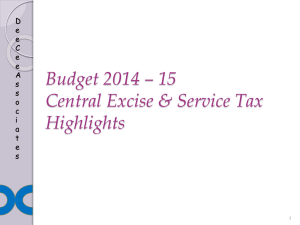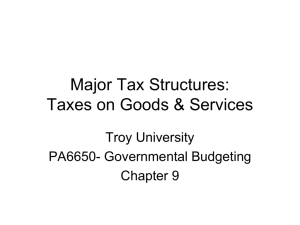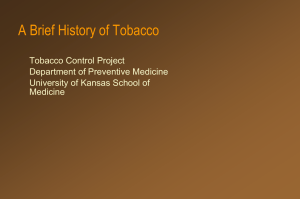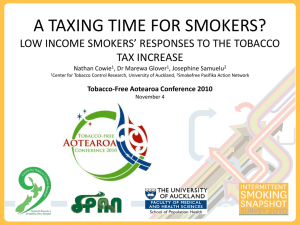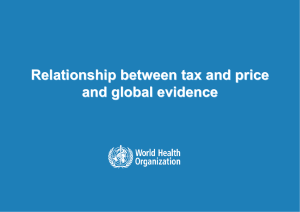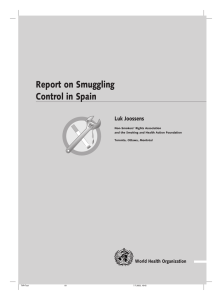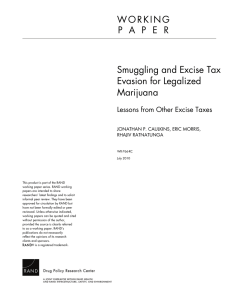Tobacco Taxation in the European Union
advertisement
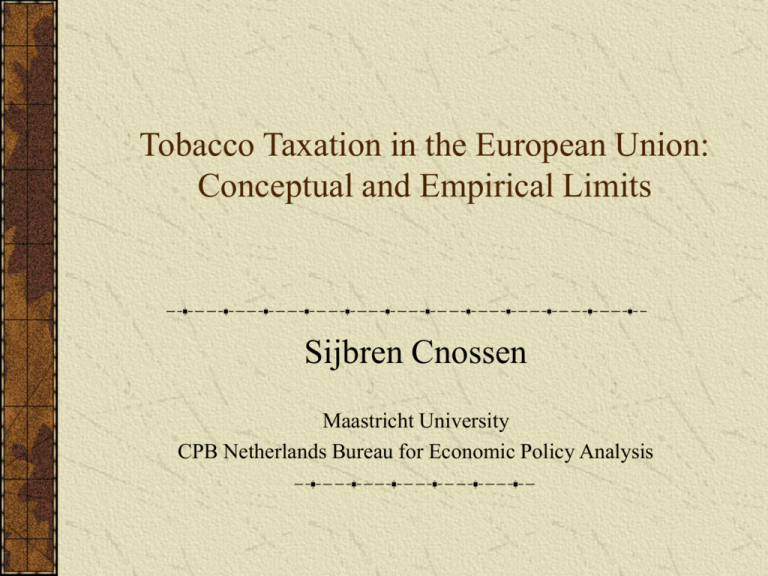
Tobacco Taxation in the European Union: Conceptual and Empirical Limits Sijbren Cnossen Maastricht University CPB Netherlands Bureau for Economic Policy Analysis Is Tobacco Consumption Bad for Your Health? Aspect Consortium …smoking is a deadly disease …killing 625,000 people (one in seven of all deaths) each year in the EU …and involving gross social costs of 1.04% to 1.39% of GDP Who should pay for these costs and how? Should Smokers Pay for Social Costs through Separate Excises? Yes, but only insofar social costs represent external costs (see below) PS. Are separate excises justified for revenue purposes? - low collection costs - few distortions (inverse elasticity rule) Arguments not persuasive; also, equity concerns What Are Social Costs? WHO: social costs are everything that happens in a world with smokers that does not happen in a world without smokers In short: every cigarette is bad for people’s health; accords with WHO’s health intervention policy Social costs (benefits) = private costs (benefits) + external costs (benefits) External Costs not Social Costs Should be the Benchmark WHO’s philosophy conflicts with consumer sovereignty principle which prescribes that only external costs (i.e. costs imposed on others) are relevant for policy analysis This is known as John Stuart Mill’s harm principle John Stuart Mill’s Harm Principle “On Liberty” published in 1869: “If gambling, or drunkenness, or incontinence, or idleness, or uncleanliness, are as injurious to happiness…as many or most of the acts prohibited by law, why (it may be asked) should not law…endeavour to repress these also?” Consumer sovereignty principle only applicable to rational, fully informed individuals What Are External Costs? Kinds of costs: - financial - physical - psychological Which costs are not external? Cost savings should be taken into account: only net costs are relevant for policy analysis Do Tobacco Excises Pay for External Costs? Manning et al. (1989) - gross costs: 43 (66) dollar cents - net costs: 16 (25) dollar cents Lightwood et al. (2000): gross costs 0.11.1% of GDP Barendregt et al. (1997): net costs negative Conclusion: smokers appear to pay their way in high tobacco excise countries Do EU-Agreed Tobacco Excises Approximate External Costs? Minimum duty €64/1000 cigarettes on MPPC: €1.28 per pack of twenty Specific rate: 5-55% of retail price Total excise duty burden 57% of retail price VAT at standard rate Conclusion: answer depends on level of the excise duties How High are Tobacco Taxes in the EU? United Kingdom: €5.88 tax per pack of 20 cigarettes (of which €3.01 from specific rate); retail price €7.43 Spain: €1.76 tax per pack (of which €0.16 from specific rate); retail price €2.25 Tax differential is €4.12 per pack and price differential €5.18 or €0.26 per stick! Do Smokers Pay Their Way in the EU? Yes (and perhaps more than that) in high tobacco excise duty countries Perhaps not in low tobacco excise duty countries High or low excise duty should be expressed in absolute (not relative) amounts Differences Between Specific vs. Ad Valorem Excises Specific rates Reduce relative price differences Promote quality Promote expensive tobaccos Favor American blends Ad valorem rates Increase absolute price differences Discourage investment in quality Promote cheap tobaccos Favor cheap homegrown tobaccos Should Tobacco Excise Duties be Specific or Ad Valorem? External costs independent of price at which cigarettes are sold, so internalization of external costs favors specific over ad valorem taxation Fortunately, relationship between smoking and external costs largely linear, so average uniform excise duty can be levied Ad valorem taxation confined to VAT How High Should Cigarettes be Taxed? Conceptual limit: not higher than level of external costs Empirical limit: not higher than can be enforced (doubtful for predominantly specific taxes up to 300% of pre-retail price vs. 19% VAT) Tobacco taxes in EU twice as high as in US Bootlegging and Smuggling Definitions - bootlegging: purchase of cigarettes in low-tax countries in excess of indicated cross-border shopping allowances - smuggling: purchase of cigarettes without payment of duty (includes duty-free shipments between EU Member States which are subsequently diverted to illegal market) What is Extent of Bootlegging and Smuggling? UK: one in five cigarettes is from the black market Bootlegging and smuggling: 10 percent of consumption in EU Fifty criminal networks in EU Smuggling worldwide: 6 percent of consumption = consumption in the US Double-digit smuggling as dangerous as doubledigit inflation What Should be Done about Smuggling and Bootlegging? Smuggling is predominantly enforcement issue: tighter border controls, cooperation with producing countries, control of manifests, prepayment of duty (?) Bootlegging is predominantly excise harmonization issue: approximation of duty levels on the basis of specific rates What About Specific Problem Areas? Youth smoking (information failures): best tackled through wider dissemination of facts about smoking and restricted availability of cigarettes Environmental tobacco smoke: best tackled through smoking regulations in public places Conclusions For high excises Revenue Protection of the young (specific rate)? Against high excises Principle of consumer sovereignty Low net external costs Equity aspects Smuggling Final Words! Was ich noch zu sagen hätte, dauert eine Zigarette …! Conceptual and empirical limits to excessively high levels of tobacco taxation
